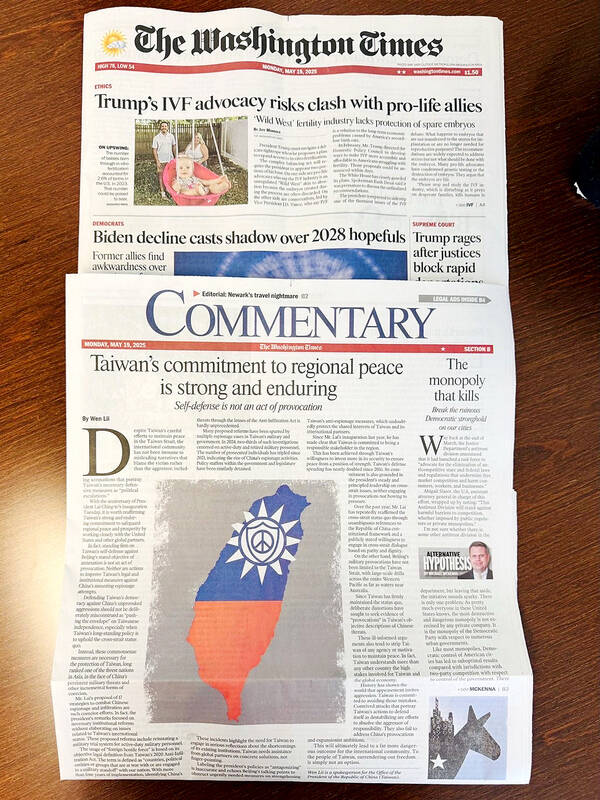President William Lai (賴清德) is not being provocative by “standing firm” on Taiwan’s self-defense, and labeling his actions as such absolves China of responsibility, Presidential Office spokesman Lii Wen (李問) wrote in an opinion piece for the Washington Times published on Sunday.
“Standing firm on Taiwan’s self-defense against Beijing’s stated objective of annexation is not an act of provocation,” Lii said ahead of the anniversary of Lai’s first year in office on Tuesday.
China’s narrative that Taiwan’s defensive measures are escalatory is “misleading,” given Taiwan’s commitment to regional peace and China’s unprovoked aggressions, Lii wrote.

Photo courtesy of a reader via the Liberty Times
“Taiwan’s long-standing policy is to uphold the cross-strait status quo,” he said.
Lii defended Lai’s 17 strategies to combat Chinese espionage attempts, saying that they are “necessary institutional reforms” that do not touch on Taiwan’s international status.
For example, identifying China as a “foreign hostile force” is “hardly unprecedented,” he said.
“Many proposed reforms have been spurred by multiple espionage cases in Taiwan’s military and government,” Lii said, adding that since 2021, the number of prosecutions for espionage cases has tripled, and a majority of investigations center on active-duty or retired military personnel.
The incidents “highlight the need for Taiwan to engage in serious reflections about the shortcomings of its existing institutions,” with help from international partners, Lii said.
He called on the international community to avoid blaming Taiwan or saying the nation is “pushing the envelope,” adding that this mirrors “Beijing’s talking points.”
“Taiwan is committed to being a responsible stakeholder in the region ... neither engaging in provocations nor bowing to pressure,” he said.
Lai has reaffirmed the cross-strait “status quo,” made clear references to the Republic of China (Taiwan) and expressed a willingness to engage in cross-strait dialogue, Lii said.
“On the other hand, Beijing’s military provocations have not been limited to the Taiwan Strait, with large-scale drills across the entire western Pacific as far as waters near Australia,” he said, linking Taiwan’s security to regional peace.
“History has shown the world that appeasement invites aggression,” he said, adding that labeling Taiwan’s defensive actions as destabilizing absolves China of responsibility and fails to address its expansionist ambitions.
“To the people of Taiwan, surrendering our freedom is simply not an option,” Lii said.

Taiwanese can file complaints with the Tourism Administration to report travel agencies if their activities caused termination of a person’s citizenship, Mainland Affairs Council Minister Chiu Chui-cheng (邱垂正) said yesterday, after a podcaster highlighted a case in which a person’s citizenship was canceled for receiving a single-use Chinese passport to enter Russia. The council is aware of incidents in which people who signed up through Chinese travel agencies for tours of Russia were told they could obtain Russian visas and fast-track border clearance, Chiu told reporters on the sidelines of an event in Taipei. However, the travel agencies actually applied

New measures aimed at making Taiwan more attractive to foreign professionals came into effect this month, the National Development Council said yesterday. Among the changes, international students at Taiwanese universities would be able to work in Taiwan without a work permit in the two years after they graduate, explainer materials provided by the council said. In addition, foreign nationals who graduated from one of the world’s top 200 universities within the past five years can also apply for a two-year open work permit. Previously, those graduates would have needed to apply for a work permit using point-based criteria or have a Taiwanese company

The Shilin District Prosecutors’ Office yesterday indicted two Taiwanese and issued a wanted notice for Pete Liu (劉作虎), founder of Shenzhen-based smartphone manufacturer OnePlus Technology Co (萬普拉斯科技), for allegedly contravening the Act Governing Relations Between the People of the Taiwan Area and the Mainland Area (臺灣地區與大陸地區人民關係條例) by poaching 70 engineers in Taiwan. Liu allegedly traveled to Taiwan at the end of 2014 and met with a Taiwanese man surnamed Lin (林) to discuss establishing a mobile software research and development (R&D) team in Taiwan, prosecutors said. Without approval from the government, Lin, following Liu’s instructions, recruited more than 70 software

Taiwanese singer Jay Chou (周杰倫) plans to take to the courts of the Australian Open for the first time as a competitor in the high-stakes 1 Point Slam. The Australian Open yesterday afternoon announced the news on its official Instagram account, welcoming Chou — who celebrates his 47th birthday on Sunday — to the star-studded lineup of the tournament’s signature warm-up event. “From being the King of Mandarin Pop filling stadiums with his music to being Kato from The Green Hornet and now shifting focus to being a dedicated tennis player — welcome @jaychou to the 1 Point Slam and #AusOpen,” the